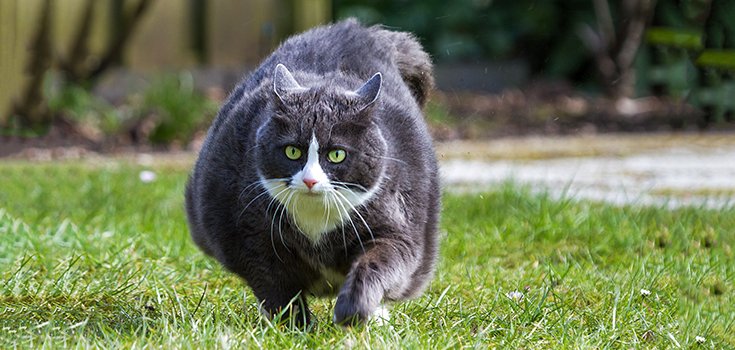Too Many Americans are Obese, and it’s Rubbing off on Their Pets

People like to think that lazy dogs are cute and cuddly, and fat cats are funny and huggable, but when you think about it, obesity and immobility really shouldn’t be traits that you want for your pet. Unfortunately, according to a recent study, obesity is no longer just a people problem, it’s becoming a pet problem.
Dr. Kirk Breuninger, the lead veterinary researcher behind a recent Banfield Pet Hospital study says overweight and obese pet parents are passing along their poor lifestyle choices and excess pounds onto their “fur babies.”
“We’ve been seeing that over the past ten years, overweight and obesity in our cats and dogs has increased by 160 to 170%.”
Your Great Dane, Fluffy, isn’t going to walk herself. She can’t make herself dinner. If you say cheese puffs are dinner, that’s what Fluffy is going to eat. [1]
Americans’ changing attitudes about their pets has a lot to do with the pumping-up of pets. People consider their pets to be their kids these days (guilty as charged), so if the family environment is unhealthy overall, the cats and dogs will sense it and adopt similar habits.
Breuninger said:
“We are starting to consider pets more and more to be members of our family and we like to show our affection by offering them treats and it can be pretty easy for us to offer too many treats in a single day to our pets.”
If you care about your pets, you don’t want them to suffer, but being overweight or obese can spark some of the same health problems that overweight humans suffer with, including painful conditions like arthritis and Type 2 diabetes. Treating these issues can be insanely expensive, too.
Breuninger explained:
“For example, heart disease and respiratory disease are something that we will see. Type 2 diabetes is something that we will see with cats that are obese, and we can see other diseases that are linked with dogs being overweight, such as hyperthyroidism or arthritis.”

How to tell if Your Pet is Overweight and What to Do
How can you tell if your pet is a little on the pudgy side? Looking at your pet from above, a distinct tuck should be visible at your dog or cat’s waist, according to Breuninger. From the side, you should be able to easily feel, but not see, their ribs.
Helping your pet lose weight doesn’t have to be as complicated as you might think. Simply cut back on treats, reduce meal portions to acceptable amounts, and make sure your dog gets a daily walk. Different cat breeds are larger than others, so check with a veterinarian to find out how much your cat should weigh and which diet works best for your breed.
You can also walk your cat on a leash, believe it or not. Mine almost ripped my face off the first time I put her in a harness, but maybe yours will be a little less “Freddie Krueger” than mine. Kitties do need at least 10 minutes of play a day, and their play needs are fairly specific. (But amusing and cute, I promise you.)
Said Breuninger:
“More than 20 disease conditions have been linked with pets being overweight. While some may say, ‘My pet looks cute being pudgy or plump,’ ultimately carrying those extra pounds contributes to exasperating these diseases.
We know a few things that are really linked with pets becoming overweight, one of which is pets not getting enough exercise, pets eating too much food, and pet owners who really consider pets a part of the family use treats as a form of communication with pets.” [2]
Sometimes a weight problem in a pet is the result of a thyroid problem or intestinal worms. But most of the time, it comes down to letting your pet take on an unhealthy lifestyle.
“Even small changes can have big long-term effects. Even just going a few extra blocks can have a big difference and if you think about yourself, if you don’t exercise enough you feel sluggish and not at your best and we have seen pets likely feel the same way too.”
States with the Portliest Pets
The Banfield report found that dogs living in these states are the chunkiest:
- Minnesota
- Nebraska
- Michigan
- Idaho
- Nevada
- New Mexico
- Washington
- Utah
- Indiana
- Oregon
These are the states with the fattest cats:
- Minnesota
- Nebraska
- Iowa
- Idaho
- Delaware
- Michigan
- Nevada
- Kansas
- Utah
- New Mexico [3]
Sources:
[2] USA Today
